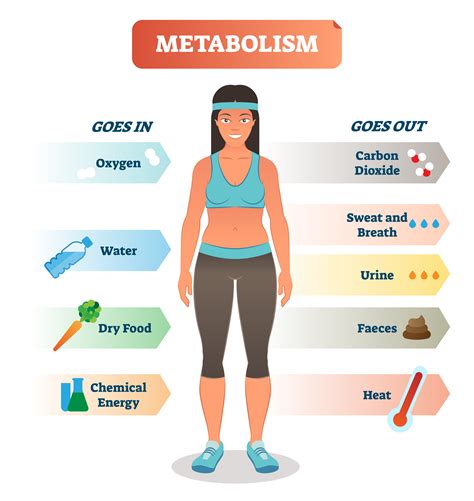Engaging in regular physical activity is undoubtedly one of the most effective ways to improve your overall wellness. By incorporating consistent exercise into your daily routine, you can unlock a plethora of extraordinary advantages that transcend mere physical benefits. These outcomes extend far beyond the realms of health, reaching into various aspects of your life, including emotional, cognitive, and social well-being.
When you commit to a regular exercise regimen, your body undergoes a remarkable transformation that goes beyond simple strength and endurance. Regular physical activity reinforces your body's resilience, enabling it to adapt and perform optimally in the face of various challenges. Not only does exercise strengthen your muscles and bones, but it also enhances your core balance and flexibility, ensuring holistic physical growth and development.
Furthermore, engaging in consistent physical activity acts as a catalyst for emotional upliftment. The release of endorphins, often referred to as the "feel-good" hormones, during exercise fosters a sense of happiness and joy. This natural mood booster not only battles stress, anxiety, and depression but also promotes mental clarity, alertness, and rejuvenation. By adding a dose of exercise to your routine, you unlock a gateway to an improved emotional well-being and a more positive outlook on life.
In addition to the physical and emotional benefits of regular exercise, there is substantial evidence to support its positive impact on cognitive functioning. Engaging in activities that elevate your heart rate and challenge your mental capacities increases blood flow and oxygen supply to the brain. This surge in neural activity enhances memory, concentration, and overall cognitive performance, empowering you to tackle mental tasks and challenges with greater efficiency and clarity.
Moreover, participating in regular exercise creates numerous opportunities for social interaction and connection. Engaging in group fitness classes, team sports, or even casual physical activities with friends and family fosters a sense of camaraderie and mutual support. These social bonds not only provide a source of motivation and accountability but also amplify feelings of belonging, happiness, and overall life satisfaction. By incorporating exercise into your daily routine, you can forge lasting connections while maximizing your overall well-being.
Boosts Your Mood and Reduces Stress

In today's fast-paced world, finding effective ways to boost your mood and reduce stress is crucial for maintaining overall well-being. Engaging in regular physical activity has been shown to have numerous positive effects on mental health, helping to improve mood and reduce feelings of stress and anxiety.
Exercise releases endorphins, often referred to as "feel-good" hormones, that can instantly boost your mood and leave you feeling more positive and energized. These natural chemicals in the brain act as powerful mood stabilizers, promoting a sense of happiness and relaxation. Regular exercise also helps to reduce levels of cortisol, a stress hormone that can wreak havoc on both your physical and mental health. By lowering cortisol levels, exercise effectively minimizes the impact of stress on your body and mind.
Additionally, physical activity provides an opportunity for distraction and diversion from the pressures of daily life. Whether it's going for a jog in the park, joining a dance class, or practicing yoga, exercise allows you to focus your attention on the present moment, shifting your thoughts away from stressors and concerns. This mindful aspect of exercise can have a profound impact on reducing anxiety and promoting overall mental well-being.
| By boosting your mood and reducing stress, regular exercise can: |
| - Enhance your ability to cope with challenges and setbacks |
| - Improve your overall mental clarity and cognitive function |
| - Increase your self-confidence and self-esteem |
| - Aid in better sleep patterns and quality of sleep |
| - Provide a healthy and productive outlet for negative emotions |
| - Foster a sense of accomplishment and satisfaction |
| - Promote social interaction and connectedness |
| - Reduce the risk of developing mental health disorders |
| - Improve your overall quality of life and happiness |
Incorporating regular exercise into your routine can truly transform your mood and reduce the impact of stress in your life. Whether it's a brisk walk, a yoga session, or a heart-pumping workout, find an activity that you enjoy and make it a regular part of your day. Your mind and body will thank you for it.
Improves Sleep Quality and Energy Levels
Getting adequate and restful sleep is essential for optimal well-being. Engaging in regular physical activity can greatly contribute to improving the quality of your sleep and increasing your overall energy levels. By participating in exercise, you can enhance your sleep patterns, reducing the time it takes for you to fall asleep and increasing the duration of deep sleep.
Regular exercise has been shown to regulate your body's internal clock, known as the circadian rhythm, which helps coordinate various biological processes, including sleep-wake cycles. By engaging in physical activity during the day, you can align your body's natural rhythm and promote better sleep at night.
Exercise also helps in reducing the symptoms of insomnia and other sleep disorders, as it helps to decrease anxiety and stress levels, which are often major contributors to sleep disturbances. When you exercise, your body releases endorphins, which are known as the "feel-good" hormones. These hormones can help to uplift your mood, relieve tension, and induce a sense of calmness, all of which can lead to a more peaceful and uninterrupted sleep.
In addition to improving sleep quality, regular exercise can significantly boost your energy levels throughout the day. Engaging in physical activities increases blood flow and oxygen delivery to your muscles, tissues, and organs, which enhances their functionality. This improved circulation improves the efficiency of your cardiovascular system, reducing feelings of fatigue and promoting alertness and vitality.
Furthermore, exercise stimulates the production of neurotransmitters such as dopamine and serotonin, which play a crucial role in regulating mood and energy levels. Physical activity also promotes the release of endorphins, which not only improves sleep but also provides a natural boost of energy and a sense of overall well-being.
Overall, incorporating regular exercise into your lifestyle can have a positive impact on your sleep quality and energy levels. By aligning your body's natural circadian rhythm, reducing stress and anxiety, and enhancing blood flow and neurotransmitter production, exercise can help you achieve a more restful sleep and increase your daily energy, leading to improved health and well-being.
Enhances Brain Function and Cognitive Abilities

The positive effects of engaging in regular physical activity go beyond just improving physical health. Regular exercise also has significant benefits for brain function and cognitive abilities.
Physical activity has been found to stimulate the production of neurochemicals in the brain that enhance cognitive function. These neurochemicals, such as dopamine and serotonin, improve mood, reduce stress, and promote overall mental well-being.
Moreover, regular exercise has been linked to enhanced memory and learning capabilities. It promotes the growth of new neurons in the hippocampus, a region of the brain associated with memory and learning, which in turn improves cognitive performance.
Engaging in physical activity also increases blood flow and oxygen delivery to the brain. This helps nourish brain cells and improve their efficiency, resulting in enhanced focus, attention, and mental clarity.
Furthermore, regular exercise has been shown to protect against age-related cognitive decline. It can help prevent or delay the onset of neurodegenerative diseases such as Alzheimer's and dementia, by maintaining healthy brain structures and functions.
In addition to these long-term benefits, exercise can also provide immediate cognitive boosts. Engaging in physical activity before engaging in mentally challenging tasks has been found to improve cognitive performance and decision-making abilities.
Incorporating regular physical activity into your lifestyle can have significant positive effects not only on your physical health but also on your brain function and cognitive abilities. So, it's important to make exercise a priority for overall well-being.
| Improved Mood | Enhanced Memory |
| Reduced Stress | Increased Focus |
| Enhanced Mental Clarity | Protection Against Cognitive Decline |
| Improved Decision-making | Healthy Brain Structures |
Strengthens Your Immune System
Enhancing the robustness of your body's defense mechanisms is an essential outcome of adopting a consistent physical activity routine. Regular engagement in exercise fortifies your immune system, putting you in a better position to ward off illnesses and infections.
Here are several ways in which exercise strengthens your immune system:
- Boosts circulation: Physical activity promotes increased blood flow throughout your body, allowing immune cells to travel more efficiently to all the necessary areas.
- Reduces inflammation: Regular exercise has been shown to decrease chronic inflammation in the body, which can have a detrimental impact on immune function.
- Enhances antibody response: Engaging in exercise stimulates the production of antibodies and immunoglobulins, vital components of your immune system that help fight off foreign invaders.
- Increases white blood cell activity: Physical activity activates white blood cells, enabling them to more effectively target and eliminate pathogens that may cause illness.
- Improves respiratory health: Regular exercise can strengthen your respiratory system, helping to protect against respiratory infections and illnesses.
- Regulates stress levels: Exercise is a powerful stress reliever, and high stress levels can compromise immune function. By managing stress, physical activity indirectly supports a stronger immune system.
- Enhances sleep quality: Regular exercise has been shown to improve sleep quality, which is important for maintaining a healthy immune system.
- Supports healthy weight management: Engaging in regular exercise can assist in weight management, reducing the risk of obesity-related immune system impairments.
- Improves overall well-being: Regular physical activity has numerous benefits, such as boosting your mood and reducing anxiety and depression, which can indirectly contribute to a stronger immune system.
- Positively influences gut health: Exercise can have a positive impact on the composition of gut bacteria, which plays a crucial role in overall immune function.
By incorporating regular exercise into your lifestyle, you are actively strengthening your immune system's ability to protect your body and promote optimal health.
Enhancing Body Composition and Boosting Metabolic Rate

Regular physical activity plays a vital role in optimizing body composition and enhancing metabolic rate. Engaging in physical exercise on a consistent basis helps in managing body weight more effectively and improves overall wellbeing.
Exercise aids in achieving a healthy balance between body fat and muscle mass. By participating in regular physical activities, individuals can stimulate muscle growth and increase muscle strength, resulting in a more toned and sculpted physique. Furthermore, exercise promotes the burning of excess calories and helps to maintain a healthy body weight.
Increased physical activity leads to an elevation in metabolic rate, which refers to the number of calories that the body burns at rest. Consistently engaging in exercise revs up the metabolic processes, allowing for more efficient energy utilization. This helps individuals to expend more calories throughout the day, even when engaged in sedentary activities.
Not only does exercise assist in weight management, but it also aids in preventing weight gain. Regular physical activity helps to counteract the natural slowing of metabolism that often occurs with age. By keeping the metabolic rate elevated, exercise helps to mitigate age-related weight gain.
Moreover, exercise has been found to have a positive impact on the body's ability to break down and metabolize fat cells. Physical activity stimulates enzymes and hormones that facilitate the breakdown of stored fat, leading to weight loss and improved body composition.
Incorporating regular exercise into one's routine can be a powerful tool in maintaining a healthy weight, promoting a leaner physique, and optimizing metabolic rate. By engaging in physical activity, individuals can reap the numerous benefits of weight management and enhanced metabolism, ultimately contributing to better overall health and wellbeing.
Reduces the Risk of Chronic Diseases and Promotes Longevity
Leading a physically active lifestyle has a profound impact on our overall well-being and can significantly diminish the likelihood of developing chronic illnesses, thereby contributing to a longer and healthier life. Engaging in regular physical activity not only enhances our physical fitness but also bolsters our body's defense mechanisms against various diseases.
Consistent exercise routines have been proven to fortify our immune system, making us more resilient to infections and illnesses. Additionally, regular physical activity helps prevent the occurrence of unwelcome health conditions such as cardiovascular diseases, diabetes, and obesity. By improving our cardiovascular health, exercise promotes efficient blood circulation and oxygenation throughout our body, reducing the risk of heart attacks, strokes, and other cardiovascular problems.
Moreover, incorporating exercise into our daily lives assists in maintaining optimal body weight, muscle strength, and bone density. It aids in reducing excess body fat and improving metabolic functions, ultimately minimizing the chances of developing chronic conditions like type 2 diabetes and certain types of cancer. Regular physical activity also enhances mental well-being by releasing endorphins, which uplift our mood and alleviate symptoms of depression and anxiety.
Furthermore, exercise plays a critical role in maintaining cognitive function and preventing mental decline as we age. It stimulates brain activity, enhances memory and concentration, and decreases the risk of neurodegenerative diseases such as Alzheimer's and dementia.
By adopting a lifestyle that prioritizes regular physical activity, we can significantly reduce the likelihood of suffering from chronic diseases and increase our overall life expectancy. Emphasizing the importance of exercise not only improves our physical health but also leads to improved mental well-being, ensuring a higher quality of life for years to come.
FAQ
What are the benefits of regular exercise?
Regular exercise has numerous benefits for both your physical health and overall well-being. It helps in weight management, strengthens muscles and bones, improves cardiovascular health, reduces the risk of chronic diseases such as diabetes and heart disease, boosts immune system, enhances mental health, promotes better sleep, increases energy levels, and improves cognitive function.
How often should I exercise to reap the benefits?
To enjoy the benefits of regular exercise, it is recommended to engage in some form of physical activity at least 150 minutes per week, spread out over several days. Ideally, aim for 30 minutes of moderate-intensity exercise on most days of the week. You can also opt for 75 minutes of vigorous-intensity exercise if your fitness level allows.
Can exercise help in weight management?
Absolutely! Regular exercise plays a crucial role in weight management. It helps burn calories and increases metabolism, leading to weight loss or weight maintenance. Combining exercise with a healthy diet is the most effective approach to achieve and maintain a healthy weight.
Does exercise improve mental health?
Yes, exercise has a profound impact on mental health. It boosts the production of endorphins, which are known as "feel-good" hormones, resulting in reduced symptoms of anxiety and depression. Regular exercise also helps alleviate stress and improve overall mood, leading to better mental well-being.
Can exercise improve sleep quality?
Absolutely! Engaging in regular exercise can significantly improve the quality of your sleep. Physical activity helps regulate sleep patterns, reduces insomnia, and promotes a deep and restful sleep. Just make sure to finish your exercise session at least a few hours before bedtime to allow your body to wind down.
What are the benefits of regular exercise for my health?
Regular exercise has numerous benefits for your health. It can help reduce the risk of chronic diseases such as cardiovascular disease, type 2 diabetes, and certain cancers. Exercise can improve your cardiovascular health, strengthen your muscles and bones, and boost your immune system. It also helps maintain a healthy weight, improves mental health, and enhances your overall well-being.



